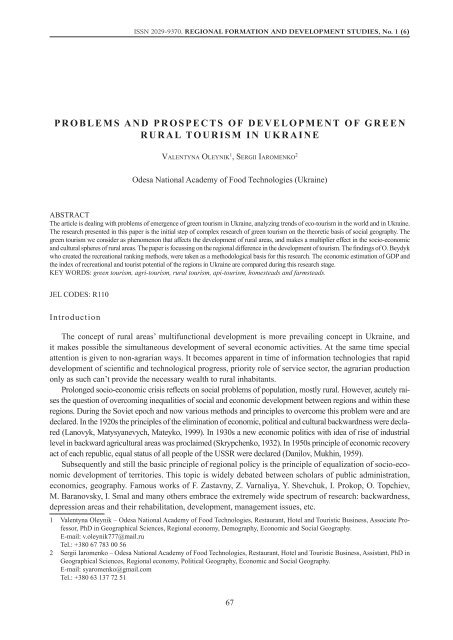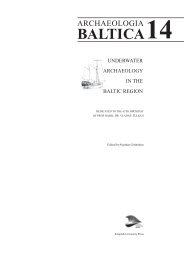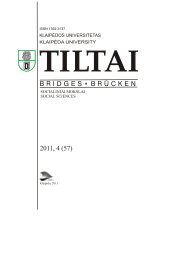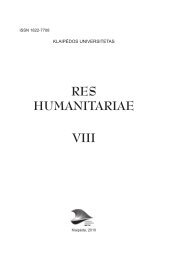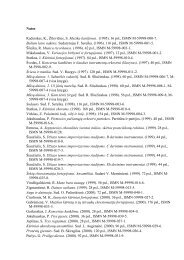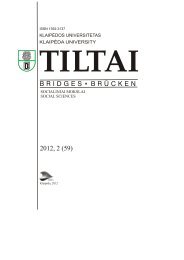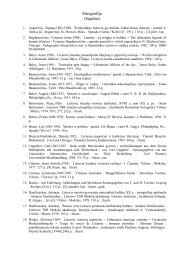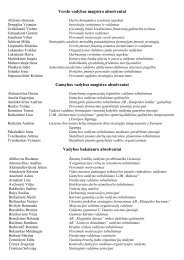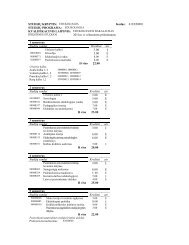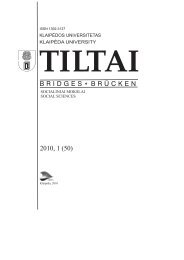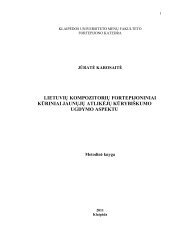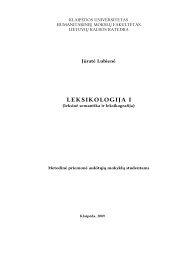Regional Formation 2012,1 - KlaipÄdos universitetas
Regional Formation 2012,1 - KlaipÄdos universitetas
Regional Formation 2012,1 - KlaipÄdos universitetas
You also want an ePaper? Increase the reach of your titles
YUMPU automatically turns print PDFs into web optimized ePapers that Google loves.
ISSN 2029-9370. <strong>Regional</strong> <strong>Formation</strong> and Development Studies, No. 1 (6)<br />
PROBLEMS AND PROSPECTS OF DEVELOPMENT OF GREEN<br />
RURAL TOURISM IN UKRAINE<br />
Valentyna Oleynik 1 , Sergii Iaromenko 2<br />
Odesa National Academy of Food Technologies (Ukraine)<br />
Abstract<br />
The article is dealing with problems of emergence of green tourism in Ukraine, analyzing trends of eco-tourism in the world and in Ukraine.<br />
The research presented in this paper is the initial step of complex research of green tourism on the theoretic basis of social geography. The<br />
green tourism we consider as phenomenon that affects the development of rural areas, and makes a multiplier effect in the socio-economic<br />
and cultural spheres of rural areas. The paper is focussing on the regional difference in the development of tourism. The findings of O. Beydyk<br />
who created the recreational ranking methods, were taken as a methodological basis for this research. The economic estimation of GDP and<br />
the index of recreational and tourist potential of the regions in Ukraine are compared during this research stage.<br />
KEY WORDS: green tourism, agri-tourism, rural tourism, api-tourism, homesteads and farmsteads.<br />
JEL codes: R110<br />
Introduction<br />
The concept of rural areas’ multifunctional development is more prevailing concept in Ukraine, and<br />
it makes possible the simultaneous development of several economic activities. At the same time special<br />
attention is given to non-agrarian ways. It becomes apparent in time of information technologies that rapid<br />
development of scientific and technological progress, priority role of service sector, the agrarian production<br />
only as such can’t provide the necessary wealth to rural inhabitants.<br />
Prolonged socio-economic crisis reflects on social problems of population, mostly rural. However, acutely raises<br />
the question of overcoming inequalities of social and economic development between regions and within these<br />
regions. During the Soviet epoch and now various methods and principles to overcome this problem were and are<br />
declared. In the 1920s the principles of the elimination of economic, political and cultural backwardness were declared<br />
(Lanovyk, Matysyanevych, Mateyko, 1999). In 1930s a new economic politics with idea of rise of industrial<br />
level in backward agricultural areas was proclaimed (Skrypchenko, 1932). In 1950s principle of economic recovery<br />
act of each republic, equal status of all people of the USSR were declared (Danilov, Mukhin, 1959).<br />
Subsequently and still the basic principle of regional policy is the principle of equalization of socio-economic<br />
development of territories. This topic is widely debated between scholars of public administration,<br />
economics, geography. Famous works of F. Zastavny, Z. Varnaliya, Y. Shevchuk, I. Prokop, O. Topchiev,<br />
M. Baranovsky, I. Smal and many others embrace the extremely wide spectrum of research: backwardness,<br />
depression areas and their rehabilitation, development, management issues, etc.<br />
1 Valentyna Oleynik – Odesa National Academy of Food Technologies, Restaurant, Hotel and Touristic Business, Associate Professor,<br />
PhD in Geographical Sciences, <strong>Regional</strong> economy, Demography, Economic and Social Geography.<br />
E-mail: v.oleynik777@mail.ru<br />
Tel.: +380 67 783 00 56<br />
2 Sergii Iaromenko – Odesa National Academy of Food Technologies, Restaurant, Hotel and Touristic Business, Assistant, PhD in<br />
Geographical Sciences, <strong>Regional</strong> economy, Political Geography, Economic and Social Geography.<br />
E-mail: syaromenko@gmail.com<br />
Tel.: +380 63 137 72 51<br />
67


